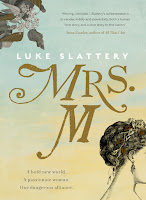 Staff review by Chris Saliba
Staff review by Chris SalibaJournalist and academic Luke Slattery has richly imagined the life of Elizabeth Macquarie, wife of early Australian governor Lachlan Macquarie.
1807. At the age of twenty-six Elizabeth Campbell marries Colonel Lachlan Maquarie, a man some twenty years her senior (and also a distant cousin). A mere two years later, in 1809, Maquarie is appointed governor of New South Wales. Elizabeth takes the perilous journey with her new husband to the other side of the world, leaving her native Scotland. What will she find? How will she cope?
Mrs M, by journalist and academic Luke Slattery, covers the period of Macquarie's governorship, from late 1809 to 1821. The novel opens with Elizabeth on the Scottish isle of Mull after she has buried Macquarie, spending a moody night of reverie recalling the major events of her life. There is the tumultuous journey, with its miserable cargo of convicts; the natural wonders of the new world, its flora and fauna; the indigenous people, notably the Aboriginal leader Bungaree and his wife, Gooseberry; and the politics of New South Wales, especially the rivalry and contempt between the convicts and free settlers.
Slattery's story has two main dramatic focuses. Firstly, the intense friendship between Elizabeth and the convict-architect Francis Greenway (his work is widely known and admired in Sydney today). Greenway was found guilty of fraud, narrowly escaped hanging and was sentenced to Botany Bay. In line with Macquarie's progressive policies, Greenway was given opportunities to pursue his talents and thus improve his lot. He started work as an architect for the colony, bringing him into close contact with Elizabeth and Macquarie. When Elizabeth and Francis learn of each other's joint passion for art and beauty, they develop an intense relationship that could almost be described as romantic.
The second subject the book deals with is the shabby treatment of Macquarie himself. The English Tory government of the time loathed Macquarie's progressive policies and determined to remove him. To that end Commissioner John Thomas Bigge was sent to write a report on Macquarie's running of the colony. It was a hatchet job right from the start. Aware of what was afoot, Macquarie quit. The three volume report that Bigge submitted and later published ruined Macquarie's reputation and his health. He died soon after.
Luke Slattery first tackled this subject matter in his short history, The First Dismissal (Penguin Special, 2015). In the author's note for Mrs M he writes that Elizabeth's voice came to him in a dream. Indeed, this is a wonderfully dreamy and elegantly written portrait of Elizabeth and her time in New South Wales. It has an aesthetic style, with its sensuous rhythms, reminiscent of the great 19th century literary stylist Walter Pater. Elizabeth's acute observations and sharp eye also recall Jane Austen (Austen's major works were written during the period the novel covers). Some historical novels can fail by sticking too close to the facts and not concentrating enough on character and psychology. Mrs M doesn't fall into this trap; Elizabeth has a richly imagined inner life. As Slattery explains in his author's note, he has mixed some of his own story with that of Elizabeth's, but in the hope of telling a larger truth about some aspects of Australia's history. Fact and fiction deliciously intertwine.
Mrs M is an immersive experience that you won't be able to put down, mixing Australian history with a forbidden love story, creating a literary journey to savour.
Mrs M, by Luke Slattery. Published by 4th Estate. ISBN: 9780732271817 RRP: $29.99
To sign up for our monthly newsletter, featuring new releases, book reviews and favourite articles from around the web, click here.
No comments:
Post a Comment